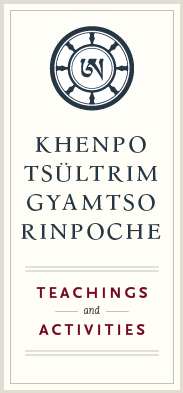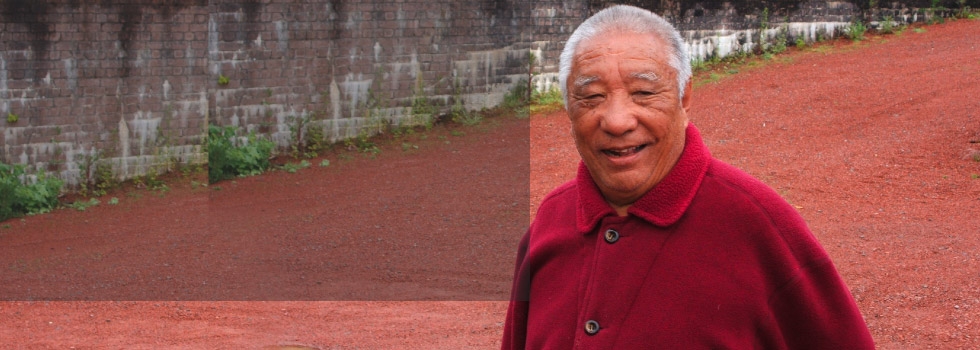You are here
The Open Expanse of Space: A Commentary on the Meaning of The Eight Kinds of Mastery
Namo Shri Hasa Vajra Ye!
You didn’t back down when the going got very hard
By toughing it out you pleased your lama’s heart
With great diligence that never was faltering
You meditated on the profound meaning
Through this you realized the eight kinds of mastery
I bow at your feet, supreme Shepa Dorje.
Space’s open expanse has no center or boundary
It includes all the worlds of top and bottom free
It includes all of the numberless sentient beings
It includes all appearances that there ever could be
Like that is the open expanse of mind itself
Thoughts can’t experience its reality
Encompassed by this open expanse of mind
Are all the phenomena that there ever could be.
You can’t say that this mind is born or dies
“Exist,” “not exist”—all such references it transcends
Open, spacious, and relaxed are how it’s described
Mastery of it is what it means to be free
When this independence is achieved
That’s the view as mastered as it can be.
All phenomena are appearance and emptiness
They are just like what happens in a dream
So between appearances of day and night there’s no difference
Mastery of view is when this becomes certainty
When you don’t move at all from within this experience
This is as meditation as it can be.
Beginners must practice diligently
Appearances as dreams they will then see
The four elements they learn to subjugate
Changing appearances, making new ones emanate
This ability they certainly will gain
For it “dream yoga” is the well-known name.
Appearance and emptiness, dreamlike in this way
Nothing different between night and day
Certainty becomes stable and doubt-free
And then you get used to this way of reality
“By getting used to seeing things in this way
You will gain freedom,” the texts and lamas say.
When bliss and emptiness are made two different things
It’s only convention, it’s from confusion’s side
Dependently arisen, they appear differently
But that’s not how it is in the true nature of mind
When bliss and emptiness are not made different things
Conduct within that is as mastered as it can be.
When this life and the next are made into different things
It’s a difference created by confused thinking
Dependently arisen, they’re just mere appearances
Not the slightest bit different in reality
Realize this life and the next are not different things—
That’s true being as mastered as it can be.
Space has no center or boundary
No terms like these can describe its reality
Mind also transcends all description
It doesn’t exist, it isn’t nonexistent
So actually, space and mind are not different things—
Realizing this is dharmakaya mastery.
“Pleasure” and “pain” exist only for confused mind
In true being these two are equality
All your various thoughts of pleasure and pain—
In their very own place they are free
When you know this and you know it excellently
That’s pith instruction as mastered as it can be.
When wisdom is called the kleshas’ remedy
It’s from the perspective of confused thinking mind
Original wisdom in actual reality
Is klesha itself that by itself is free
When you have realized this excellently
That’s as full as realization can be.
When your mind and the Buddha are said to be different things
It’s something that’s said for confused sentient beings
Mind’s true nature has always been purity
Self-liberated, primordially free
Ground and fruition are not two different things—
That’s fruition as mastered as it can be.
And so are the eight kinds of mastery
They are the profound way of true being
Shepa Dorje’s wisdom and compassion have shone on me
And imputation’s darkness in its own place is free
And so I’ve been able to explain here concisely
The profound meaning of the eight kinds of mastery.
By the power of the virtue gathered here
May original wisdom’s sun shine brilliantly
Dispelling the darkness obscuring the profound meaning
Illuminating the minds of all sentient beings
And when this happens may all of us sentient beings
Fully realize the eight kinds of mastery.
On December 24, 1997, in the Garden of Translation near the Great Stupa of Boudhanath, Nepal, this was spoken extemporaneously by the one only called “Khenpo”, Tsultrim Gyamtso. With thanks to Jim Scott for his translation and arrangement of Milarepa’s song, The Eight Kinds of Mastery, it was translated by Ari Goldfield. Translation copyright 2012, Ari Goldfield.

